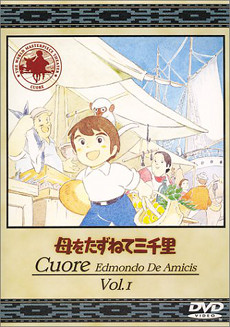3000 Leagues in Search of Mother
| 3000 Leagues in Search of Mother | |

1999 cover of the first DVD volume of the anime television series
|
|
|
母をたずねて三千里 (Haha o Tazunete Sanzenri) |
|
|---|---|
| Genre | Adventure, Drama, Historical |
| Anime television series | |
| Directed by | Isao Takahata |
| Studio | Nippon Animation |
| Original network | Fuji Television |
| Original run | 4 January 1976 – 26 December 1976 |
| Episodes | 52 |
| Anime film | |
| Directed by | Isao Takahata, Hajime Okayasu |
| Studio | Nippon Animation |
| Released | 19 July 1980 |
| Runtime | 107 minutes |
| Anime film | |
| Marco: 3000 Leagues in Search of Mother | |
| Directed by | Kozo Kuzuha |
| Studio | Nippon Animation |
| Released | 2 April 1999 |
| Runtime | 98 minutes |
3000 Leagues in Search of Mother (母をたずねて三千里 Haha o Tazunete Sanzenri?) is a Japanese anime television series directed by Isao Takahata and aired in 1976. It is loosely based on a small part of the novel Heart (Cuore) created by Edmondo De Amicis, i.e., a monthly tale (racconto mensile) From the Apennines to the Andes (Dagli Appennini alle Ande), widely expanded into a 52-episode epic.
The series was broadcast on World Masterpiece Theater, an animation staple that showcased each year an animated version of a different classic book or story. It was originally titled From the Apennines to the Andes. Nippon Animation, producers of World Masterpiece Theater, adapted Cuore into a second anime television series in 1981, although this second series was not part of the WMT.
A summarization movie was released in the 1980s using edited footage from the TV run. Nippon Animation also re-animated 3000 Leagues as a feature-length film in 1999, with a theme song performed by Scottish pop superstar Sheena Easton ("Carry a Dream", which was included in her 1999 album called Home that was only released in Japan).
The series was dubbed into several languages and became an instant success in some countries, such as Iran, Portugal, Brazil, Peru, Spain, Venezuela, Colombia, Germany, Chile, Turkey, Malaysia, the Arab world and Israel. In Hebrew, the series is called HaLev (הלב), meaning The Heart (the name of the novel that the series is based on, which was translated into Hebrew and was very popular in 1990s Israel). In some European and in Latin American countries the series is simply known as Marco. In Arabic the series was a huge success; it was called Wada'an Marco (وداعاً ماركو), meaning Goodbye Marco.
...
Wikipedia
